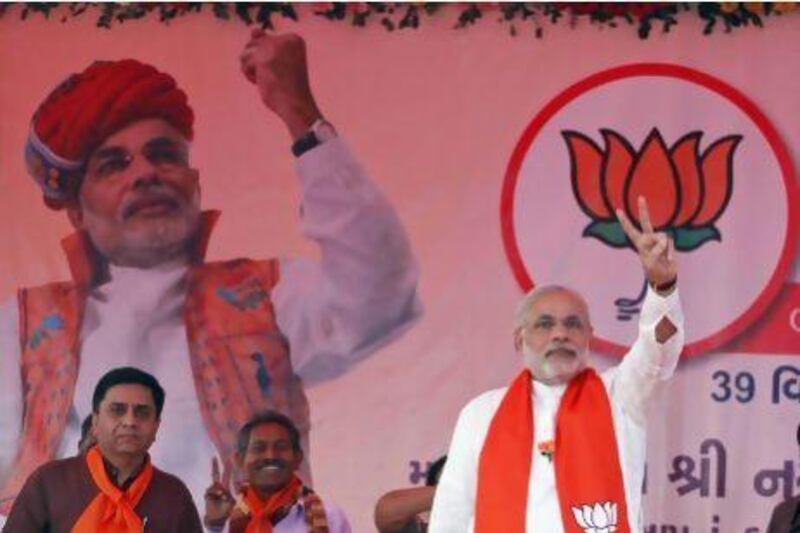AHMEDABAD // In the past two weeks, Narendra Modi has addressed campaign rallies in different cities at the same time using holographic projection that beamed his image live to crowds.
In several ways, the gimmick was symbolic of Mr Modi himself: his self-projection as a champion of industry and good governance; his fractured image, which has made him a darling of the Hindu right but a foe to India's liberals; and his flickering personality, forceful and palpable but difficult to fully decipher.
Mr Modi, 62, is running for re-election this month as chief minister of Gujarat, a post he has held since October 2001. He is credited with strengthening his Bharatiya Janata Party (BJP) in the state at the expense of the rival Congress party and his name frequently emerges as the BJP's chief contender for the prime ministerial candidate in the 2014 general elections.
But his legacy continues to be tarnished by accusations that 10 years ago he and his Hindu party colleagues had looked the other way and even encouraged mobs of Hindus as they killed and burnt their way through Muslim neighbourhoods in Gujarat, leaving more than 1,100 people dead.
He has refused to apologise for the riots, telling the Wall Street Journal in August that "one only has to ask forgiveness if one is guilty of a crime".
Mr Modi has never been charged in connection with the riots, unlike some of his former ministers and associates. Maya Kodnani, his former minister for women and child development, was convicted in August of leading an armed mob during the riots and sentenced to 28 years in prison.
Born into a middle-class family in 1950, Mr Modi joined the Rashtriya Swayamsevak Sangh (RSS), the militant Hindu nationalist organisation during his years at Gujarat University. At the time, he was regarded more as a canny organiser than as a potential leader with mass appeal.
He worked his way up through the hierarchy of the BJP, which functions a political arm of the RSS. After his chief rival, Keshubhai Patel, was removed as chief minister in 2001, the BJP picked Mr Modi as a replacement.
Mr Modi's tenure as chief minister has been defined by how he sees himself, said a political analyst working in Gujarat. He refused to be identified out of fear of harassment from Mr Modi's supporters.
"He sees himself as a lone warrior, waging a righteous battle … His identification of himself is bigger than him as a person, bigger than his political party," he said. Mr Modi thrives on "this idea that secular forces - the Congress - are against the development of Gujarat, and this he attributes to a historical bias against the state and its development goals".
Mr Modi is running on the platform of economic development and has pushed the idea that he is behind the unprecedented economic growth in Gujarat.
Gujarat's economy, between 2001 and 2010, grew at 8.68 per cent - roughly on par with the states of Haryana, Bihar, and Orissa.
On the Human Development Index, which takes into account statistics such as life expectancy, literacy and income, Gujarat ranked 11th among Indian states in 2008, slipping a rank from 1999-2000, according to India's planning commission,
Jose George, the head of the politics department at the University of Mumbai, said Mr Modi "appeals to the stock market, the business people, and the middle class. He is seen as appeasing the elite business lobby. On the other hand, the fates of the tribal areas and the rural areas have remained unchanged under his tenure."
In a rally in the Surat district of Gujarat last week, the Congress president, Sonia Gandhi, said Mr Modi has "no interest in poor and common people but [the] development of its own and a select few people ... Why is poverty still looming in the tribal population of the state?"
And Mr Modi's image, said Mr George, continues to be tainted by the riots of 2002. An informal group of US congressmen and senators are still pressing the Obama administration to deny Mr Modi an entry visa, should he ever want to visit their country.
But the BJP insists that Mr Modi has delivered uniform economic development and that his success will win him his re-election.
"There is no doubt at all that he is coming back," said Nirmala Sitaraman, the BJP's national spokesperson.
Anil Bairwal, a director for the New Delhi-based non-profit Association for Democratic Reforms, said that both the BJP and the Congress were foisting extreme images upon Mr Modi.
"The BJP is trying to show this is the ideal state and politician. The Congress says otherwise, they say this is the worst example of a politician, tainted by the 2002 riots, and that everything with Gujarat is wrong," he said.
"The truth lies somewhere in between."
sbhattacharya@thenational.ae
ssubramanian@thenational.ae





